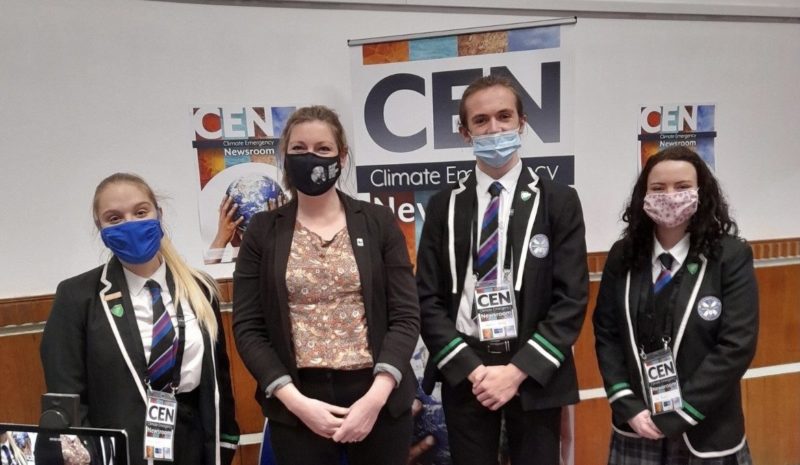Meet Lexi: Head of Communications at WWF Scotland
WWF was founded in 1961 in Switzerland. WWF works in maintaining wildlife and protecting humans from the impact of climate change. Today we interviewed Lexi Parfitt who is the head of communications at WWF Scotland.
1) What do the WWF want to see achieved as a result of COP26?
WWF feels it is a important time to move from talking to doing. For them, this means they want to make sure nations stick to their decision to keep world warming below 1.5°C. They also want countries that rely heavily on industry such as China, USA and Australia to be ambitious in order for them to cut the amount of carbon they produce, WWF feels “nature is crucial to this”.
Lexi also included that in Scotland peat bogs absorb carbon, so it is important that we make sure these are protected so they don’t release the carbon into the environment.
2) How optimistic are you that this will be achieved?
Lexi feels that she would be unable to do her job if she wasn’t optimistic and that it is important to look at things that have gone well. Important developments such as nations declaring climate emergencies also make her feel that progress can be made, one of these improvements being Scotland having 96% of their energy usage being from renewable energy sources.
Lexi also touched on the fact that even though Scotland isn’t the biggest country attending COP26, we can show how we can create change and work with smaller nations in the hope they can create similar change. Most importantly “We have reasons to be optimistic and hopeful but also to be angry. This should cause us to want our voices to be heard.”
3) What do the WWF feel is the biggest consequence of climate change?
WWFs’ biggest concern is the impact of climate change on people, particularly those in the most vulnerable places such as Africa and Latin America due to more extreme weather patterns. This is resulting in countries such as Madagascar having food shortages.
Not only are people affected, but animals are too, which impacts people who need these animals and ecosystems to survive. This is because of rising temperatures and sea levels.
WWF feel the most overlooked consequence of climate change is the impact on the vulnerable, and feel it is important for them to use their platform to make sure vulnerable people are heard. This includes giving indigenous people a voice to help them to tackle climate issues that affect them.
4) What are WWF currently doing to fight climate change?
WWF has worked with climate scientists who have also worked alongside the United Nations to understand ways in order for them to fight climate change.
Lexi also feels that the reason why WWF is so successful is due to the impact of their supporters. Involving people in the climate change conversation has helped WWF to influence political figures such as Nicola Sturgeon and Boris Johnson to make climate goals and explain how they will achieve them.
5) What more can the WWF do to fight climate change? And what plans are in place to do so?
WWF has put in place processes such as their carbon budget which limits their amount of carbon they can release, to help their organisation to become more sustainable. They are also working with other businesses to help them to change the way they are working and they are working towards the “highest possible standards we can”.
In Lexi’s words, “Nobody is perfect, and what is most important is that we all do our bit to fight climate change.” She feels imperfect action by everyone is the solution rather than perfect action by some.
6) What actions can young people take to fight climate change?
Lexi feels that the most powerful tool anyone has is their voice, and encourages you to speak up about what you want to see and happen. “Young people are crucial to this, as they have changed the perception of climate change and made people realise it is important to do more.”
Lastly, the decisions the government takes now is going to shape what jobs young people will get in the future and what society we will live in as, “we’re not going to accept empty promises”.
By Eloise McNulty, James Kealy and Ava Brown


